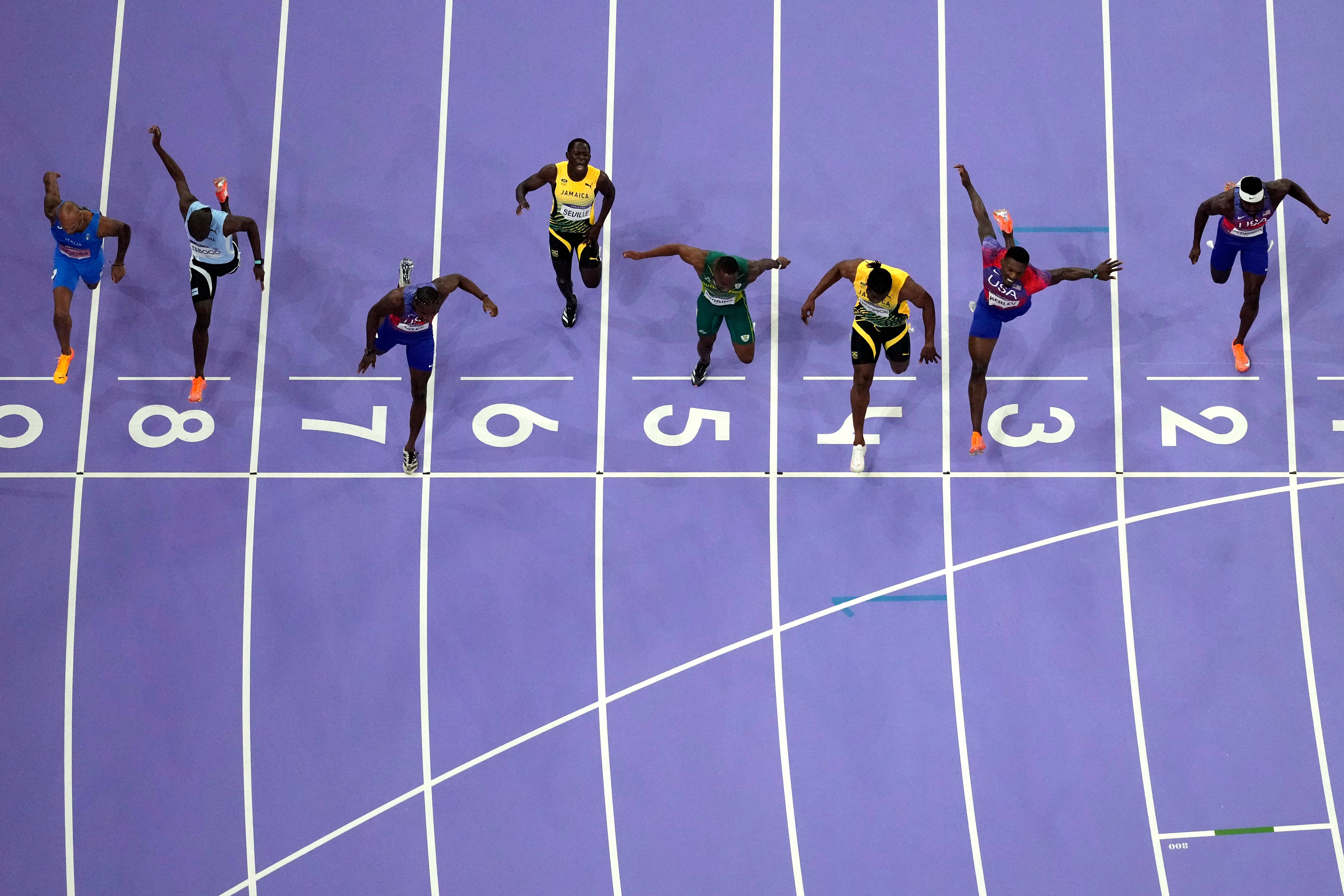‘I’m incredible’: Noah Lyles channels main-character energy to win dramatic Olympic 100m final
The American stole victory on the finish line in Paris to add Olympic gold to his world title and cement his status as the fastest man on the planet

Your support helps us to tell the story
From reproductive rights to climate change to Big Tech, The Independent is on the ground when the story is developing. Whether it's investigating the financials of Elon Musk's pro-Trump PAC or producing our latest documentary, 'The A Word', which shines a light on the American women fighting for reproductive rights, we know how important it is to parse out the facts from the messaging.
At such a critical moment in US history, we need reporters on the ground. Your donation allows us to keep sending journalists to speak to both sides of the story.
The Independent is trusted by Americans across the entire political spectrum. And unlike many other quality news outlets, we choose not to lock Americans out of our reporting and analysis with paywalls. We believe quality journalism should be available to everyone, paid for by those who can afford it.
Your support makes all the difference.World champion, Olympic champion. Noah Lyles talked an awful lot of talk in the build-up to Paris 2024, but he backed up the bluster with a late, late burst on the Stade de France track, surging past the field to pip them all on the line. There can be no argument now. “What’s the title of the Olympic champion?” Lyles said, referring to the ‘fastest man on the planet’ tag that goes with gold. “Amen.”
It doesn’t matter that he didn’t get near the world record he said he’d break, finishing in 9.79 sec; or that it came down to five thousandths of a second, less time than it takes the human eye to blink; or that he finished second in his heat and his semi-final too. Lyles delivered when it mattered most.
Jamaica’s Kishane Thompson had been burdened with the title of heir to Usain Bolt after running the fastest time this year, and he led for 99m of this race. But Lyles fought back from dead last at 40m, and they crossed the line together.
Thompson roared in celebration but his face dropped when the giant screen displayed “photo finish” by his name. They stared up from purgatory, waiting for the verdict.

“Kishane, I think you got it, man,” Lyles told Thompson, with a pat on the shoulder.
Thompson looked pained. “Come on, man!” he shouted at the screen, urging it to move. “Come on, man!”
Lyles paced with his hands on his head. Then the result came and Lyles was off again, one moment ripping the name from his chest and raising it to the gods, the next streaking across the hammer field with the stars and stripes flapping in the wind. Thompson was awarded silver as Lyles’ US teammate Fred Kerley took bronze.
“I was prepared to see his name pop up,” Lyles said. “I saw my name pop up and I said, ‘Goodness gracious, I’m incredible’. It’s the one I wanted. It’s the hard battle, the amazing opponents, everybody was healthy and came to fight. I’m the wolf among wolves.”
Lyles is the closest thing athletics has right now to a global superstar. He was placed front and centre of the Netflix documentary Sprint, which aimed to sprinkle a little of the Drive to Survive magic in athletics’ direction. It is a sport always fighting for attention, for a more permanent place in the entertainment-scape.
He embraced the role with extreme main-character energy. “I’m the third fastest human to ever live,” he bragged in one of the opening scenes. “Soon to be the first.”

His swagger was not always endearing but it was undeniably compelling. He spoke with raw honesty about the torment of failing in the spotlight, and about the depression he suffered. So when he looked into the camera and said he would become Olympic champion, you knew he meant it.
Another quote ran: “I’m a true believer that the moment isn’t bigger than me, the moment was made for me.”
Well, this was his moment. The US prides itself on its dominance in track and field but an American had not won this race for 20 years, not since Justin Gatlin in Athens. Bolt won the next three in Beijing, London and Rio before Italy’s Lamont Marcell Jacobs stunned the world in Tokyo. Jacobs finished fifth here in 9.85 sec, behind South Africa’s Akani Simbine who came fourth in 9.82.
One by one, Lyles picked them all off.
“It was hard for me to picture where we were, and I guess that was a good thing,” he said. “I was fortunate to have [Jamaica’s] Oblique Seville next to me because all throughout the year he’s been hitting that acceleration that I wasn’t hitting. I wasn’t going to let him go.”

Thompson hoped to be the first Jamaican man since Bolt to win a global 100m title.
“I’m a bit disappointed but I’m super happy and grateful at the same time,” he said. “I wasn’t patient enough with my speed and myself, I should have let my speed bring me to the line. I’ve learned from it. I couldn’t see Noah, but I think he could see me and said, ‘hey, Kishane, I thought you got it’. But he was too far to my right so I wasn’t sure. This is my closest race. It was that close.”
For Lyles, this could be just the start. He still has the 200m to come, his strongest event, as well as a 4x100m showdown with the Jamaicans.
“There’s plenty more,” he promised. “I hope you guys like Noah because I’ve got a lot more coming.”
Join our commenting forum
Join thought-provoking conversations, follow other Independent readers and see their replies
Comments